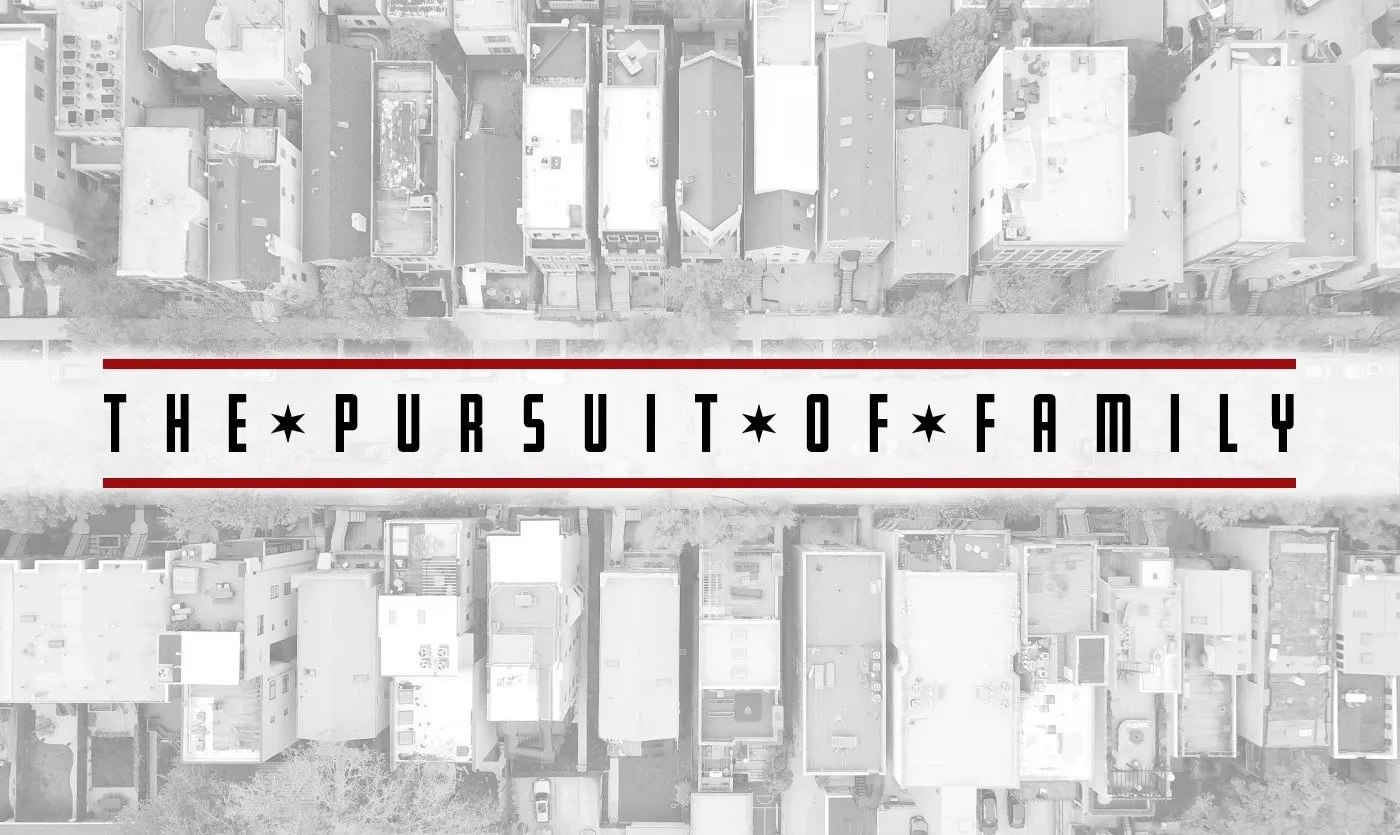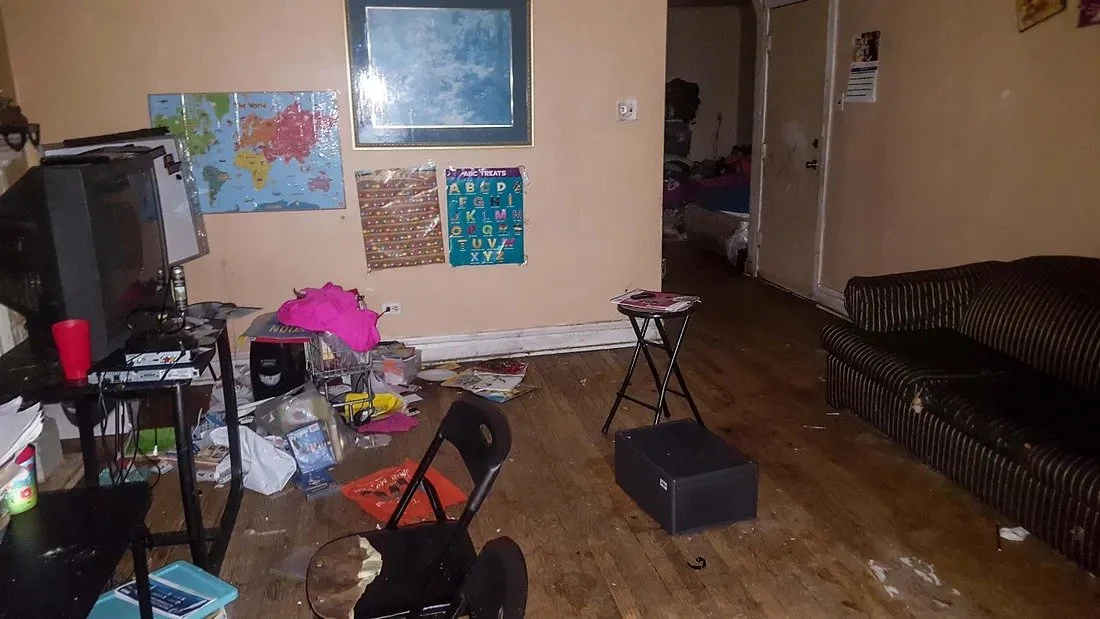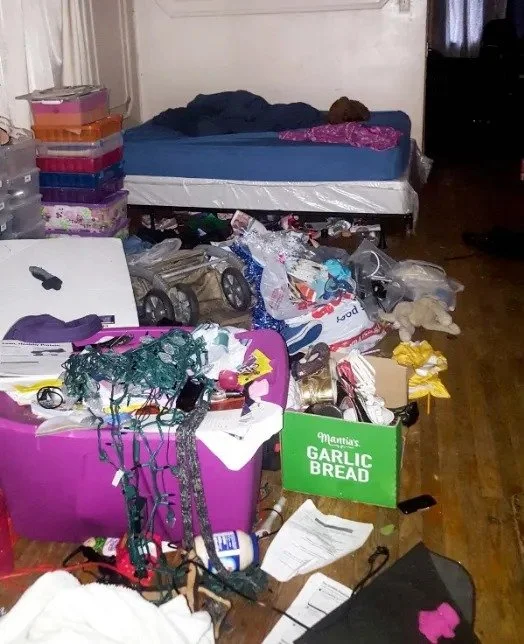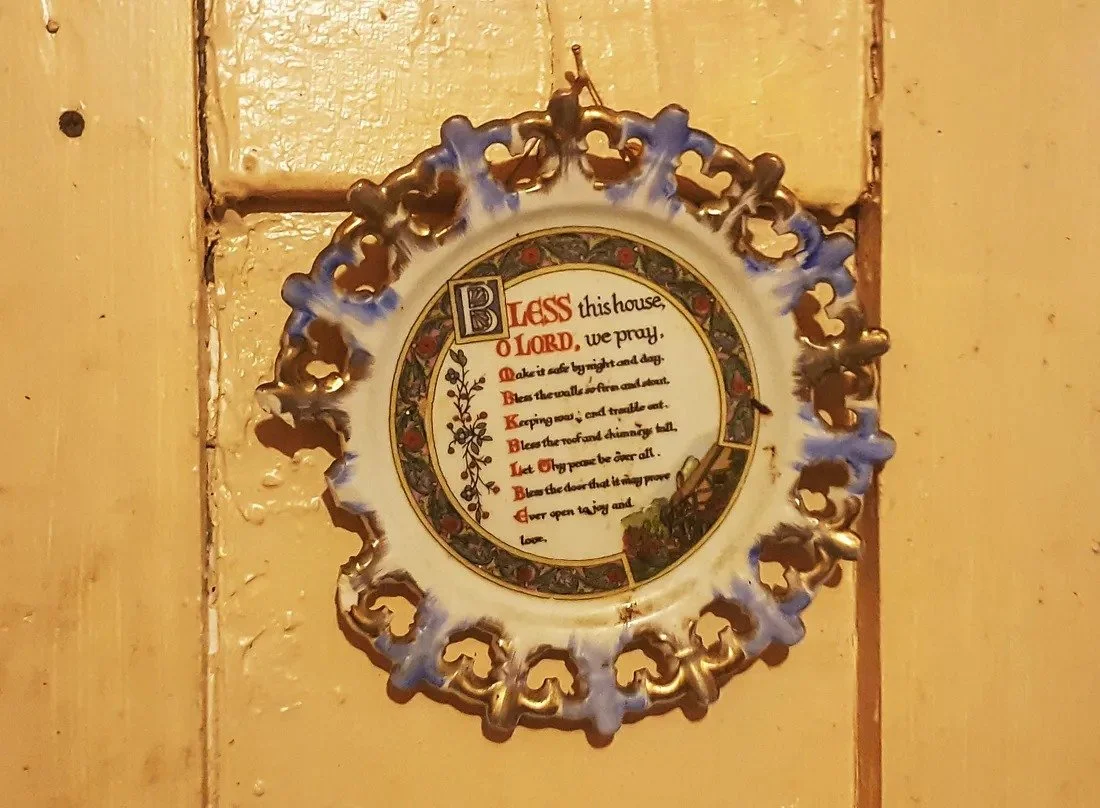How Family Affects Gang Members in Chicago
A piece from “Chicago Retold” — A project on the violence in Chicago.
by Brennan McCarthy
Malik opens the door to his new apartment and smiles. The bare, one-bedroom apartment located on the 11th floor seems barely large enough to be comfortable for his wife and him, but compared to their previous rodent-infested studio apartment, he considers it as luxurious as any mansion.
Malik (name changed for subject’s safety) spent his childhood in K-Town (North Lawndale), a neighborhood on the west side of Chicago. He lived on the second floor of a public housing unit with his mother and siblings, but when he was 11 his family was evicted and forced to move downstairs into his big momma’s (grandmother’s) two-bedroom unit with many of his extended family members. After his family’s arrival, Big Momma’s unit housed more than 20 people, most of them children.
Big Momma’s small house at one point provided shelter for more than 20 people, including Malik and his family.
Though not all homes in K-Town house double-digit numbers of people, most are considered financially unstable. According to City-Data, the median household income in North Lawndale is $28,946, compared to the Chicago average of $50,702.
Malik recalls sleeping sometimes six to a bed and sometimes on the floor with “the rats and roaches running around.” The house had one working shower. He wore the same clothes every day, and the adults of the house struggled to provide enough food for everyone.
Malik, like many other boys in Chicago, grew up without a father in the home. Statiscalatlis reported that seventy-two percent of households with children under 18 years old are managed by single moms in North Lawndale. While Malik lived in K-Town, his father was in Schaumburg, Illinois, with another woman and her kids.
“I understood that he had another family,” Malik said, “but I always felt like you should still pay attention to your other kids that you got.”
Extreme financial burdens, insufficient housing, dangerous streets, and a poorly structured family system left Malik feeling like he had limited options and little hope.
“It was really rough,” he said, “especially living in the projects where gunshots is normal to people.”
“It was really rough, especially living in the projects where gunshots is normal to people.”
- Malik
Malik’s mother worked tirelessly to move them back into their own home and put food on the table. After working three jobs for several years she was finally able to move them back into their own place.
“She showed us how to get out the mud [and] how to really go for it,” he said. However, Malik’s mother lost her career job a year later, pushing them further into debt.
Malik, a freshman at the time, determined to make money for himself.
“I decided to adapt to the life of selling drugs in order to keep money in my pocket, to be able to feed [myself], and to keep money in my mom’s pocket so that’s one less mouth she [has to] feed,” he said.
Many kids in Malik’s neighborhood were gang members. His older brother talked to the leaders on the block, and at age 13 Malik became a gang member. He said, “I joined the gang to make some money and also to have friends and have a family… My brother [would] get to arguing with somebody, and they all got his back. In grammar school [grades first through eighth], I ain’t really have that help. It was always me defending my sister, me fighting somebody, me getting jumped on… so [I thought], ‘I need to do something. I [can’t] fight just to get to the crib and then wake up in the morning just do it again.’”
As Malik grew older and found his place among the gang he made friends. They showed him how to make a living and how to have fun. They protected him and taught him how to fight.
“They kind of became my family when I wasn’t being heard in the home,” Malik said. His mother was unaware of what he was doing and would punish him for fighting at school. “And you know moms don’t even ask no questions,” he said. “They just beat you so you don’t do it again, at least my mom did… and I [was] forgotten by my real father [because] he’d be doing whatever he does.”
Unsure of how to cope with the tension in his home, Malik moved in and out, sometimes staying with friends and sometimes staying in a homeless shelter nearby.
The more time Malik spent with his gang, the more he felt at home. The guys would play basketball together and hang out after school. He had food to eat, clothes to wear, money to spend, and a place to belong.
Although some gang members are able to collect cash from selling drugs, it’s a dangerous lifestyle.
“Every day they wake up in the morning to go get that money ’cause the next man is right around the corner trying to do the same thing. And while they trying to make money the next man plottin’ to take it, and the next man plottin’ to kill,” Malik explained. Nonetheless, he continued to sell drugs.
“Every day they wake up in the morning to go get that money ’cause the next man is right around the corner trying to do the same thing. And while they trying to make money the next man plottin’ to take it, and the next man plottin’ to kill.”
- Malik
One morning on his way to school, Malik turned the corner and saw another student waiting for him. The student, parked one block from the school, pulled out a gun and opened fire on him. Terrified, Malik ran for cover in the opposite direction. He escaped and hid by the YMCA near his house.
Malik had beaten the boy in a fight a few days earlier. Angered that he had lost, the boy retaliated by trying to kill Malik.
“I was scared,” Malik said. “I felt like ‘one of these days he is going to get me. I got to take him out… I got to hurt him to where he don’t touch me no more.’”
Malik and his friends ran into the boy a few days later at school, fists clenched and ready to fight, but the boy apologized, and the situation did not escalate any further.
Malik walked away unharmed, but many of his friends in the gang have been injured or killed.
“The hardest thing was when they became my family,” he said. “I really saw them as family, and I still do. When something happens to them, it feels like it happens to my momma or sister.”
Tensions between rival gangs remain dangerously high. If a gang member finds himself in enemy territory, there will likely be consequences. The gangs keep a tight patrol of their area, always watching for unfamiliar faces, and always ready for action.
Sometimes, innocent people get caught in the crossfire.
Kaylyn Pryor, Malik’s college friend and an aspiring model, was visiting her grandparents on the Southside when she was killed in a driveby shooting.
Malik remembers talking to her the day before it happened. “Somebody just pulled over and sprayed the whole bus stop up. And she was gone,” he said.
Kaylyn Pryor is just one of Chicago’s 1,300-plus homicide victims since 2015.
Malik also recalls the painful phone call on his 19th birthday when he learned that his football coach passed away.
His football coach, Coach John, was a father figure to Malik and his teammates. They looked up to him and respected him. He helped them escape the streets, if only for a few hours each day during practice.
One of his friends from the team, Junia, often helped him with homework.
“He’d throw hands with me if I was not on my [books],” Malik said, “because that’s how his mom raised him, ’cause his mom was a single mom. He would cuss at me and get mad at me if I didn’t have my homework.”
In North Lawndale, gang activity and rival disputes sometimes carry into school, making it difficult for students to graduate. Thirty-eight percent of North Lawndale residents have attained less than a high school degree, compared to Chicago’s average of 15.9 percent (City-Data).
Junia’s influence paid off as Malik’s grades rose higher and higher. I might be the [one] to get my family out of the ghetto, Malik remembers thinking.
After some English classes at Truman College and a short stint at Trinity International University, Malik transferred to Robert Morris University to play football.
While Trinity had, for a short time, separated him from the gang and disconnected him from the drug route, Malik was once again just a few stops away from home on the blue line train.
He reconnected with his gang and re-entered the drug market. He quickly found that selling drugs in the dorm rooms was more profitable than selling drugs on the streets. It was also safer and out of sight of the police.
Malik finished at Robert Morris in 2014, the first in his family to earn a B.A. “I remember when I got that degree,” he said. “I was so proud ’cause my momma got to see me walk across that stage.”
“I remember when I got that degree. I was so proud ’cause my momma got to see me walk across that stage.”
- Malik
While at Robert Morris, Malik met his now-wife, Jada (name changed for subject’s safety), and they began dating. Once he graduated he moved into her dorm room at Columbia College, sleeping on the floor. After a few months, Jada told him he needed to stop selling drugs and “start acting like a man.”
So Malik landed a full-time job at Northwestern in 2015, and they moved into a studio apartment. Life began to change for them, and per Jada’s initiative, they attended church for Easter that April.
When they sat down in one of the old wooden pews they were quickly greeted by members of the church, people of every age and ethnicity.
“It was crazy,” Malik said, smiling as he recalled the day. “I felt like, ‘This is where I need to be. This is where my home is.’”
The pastor of that church (name withheld) said, “I think God has set up the church to be a family of families.”
He acknowledges that it can be difficult for individuals like Malik to join a church. “While we are ashamed of our sin in the past from which we have been saved, we our proud to share our story because it’s a story of redemption,” he said. “It’s a story of God’s love redeeming us, buying us back through his sacrificial act of love on the cross through his Son.”
Malik and Jada regularly attend Sunday morning services and Wednesday night prayer meetings. Malik helps run the soundboard and Jada helps lead the dance ministry.
A few months ago, Malik stood before the congregation to share his testimony. “You guys are like family to me,” he told them. While he told his story, many people sitting in the pews wiped away tears. When he finished he was met with a standing ovation.
This February, Malik and Jada moved into the one-bedroom apartment. A couple days later, Malik proposed at one of their favorite restaurants, Chicken & Waffles. Jada said yes.
Although Malik now lives on the north side of Chicago, Big Momma still lives in K-Town. Malik visited her house recently to get a haircut from his cousin. He drove quickly through the streets, knowing that if he moved too slowly the guys on the corner were likely to shoot at his car, even in broad daylight.
Big Momma houses fewer people now than when Malik lived with her.
He parked the car in front of the house. “Andre, I’m coming to the back door now,” he told his cousin on the phone as he walked through the alley.
He smiled as he walked into the kitchen to hug his cousins and nephew. There were dirty dishes in the sink and bits of food on the floor. Big Momma was resting for work the next day, but he snuck into her room to say hello and give her a hug.
Back in the kitchen, Andre was waiting with an office chair and cutters. Once they finished cutting Malik’s hair, Andre moved to the back porch for a smoke break.
Malik: “How come you don’t cut hair out here no more?”
Andre: “S — man. S — went crazy when I was cutting this guy’s hair [the other day]. I was looking at my client, working at his fade, and his friend and him weren’t looking at the alley, they was busy on they phone. Next thing I know these guys roll up and start shooting th-”
Malik: “Hey, who’s this car right here?”
Andre looked down the alley to where Malik was pointing. A four-door sedan rolled toward the house.
Andre: “S — I don’t know.”
Andre pulled a pistol out of the back of his pants and hid behind the stairs. The unknown vehicle pulled up next to Big Momma’s car. Andre put both hands on the gun. He peered out at the car. The doors opened and two men stepped out. He recognized them.
Andre: “D — , y’all m — — f — — scared me!”
The two men were his clients, coming over to the house to get a haircut. Andre put the gun back into his pants.
Andre: “Man, [you] had my knees wobbling and s — . You better make sure you call next time. I was about to light you up.”
They laughed and moved inside to the kitchen. Andre prepared his cutters while Malik grabbed his belongings and said his goodbyes. Jada was about to get off work, and he needed to pick her up downtown in the Loop, only a 15-minute drive from Big Momma’s.
A prayer of blessing hangs by the back door at Big Momma’s.
“It’s still crazy out at Big Momma’s, but I love my family,” Malik said. “I wish my cousin could come to the church. But he’s coming to the wedding, they all are. I invited my dad too.”
Malik and Jada want to finish furnishing their new apartment before they invite their church friends over for dinner. While driving to a thrift shop to search for a couch, Jada talked about the wedding plans, but Malik kept his eyes on the street, watching for danger. He smiled. The one-bedroom apartment may be small, but it is “an answer to prayer,” and a perfect place to start a family.





